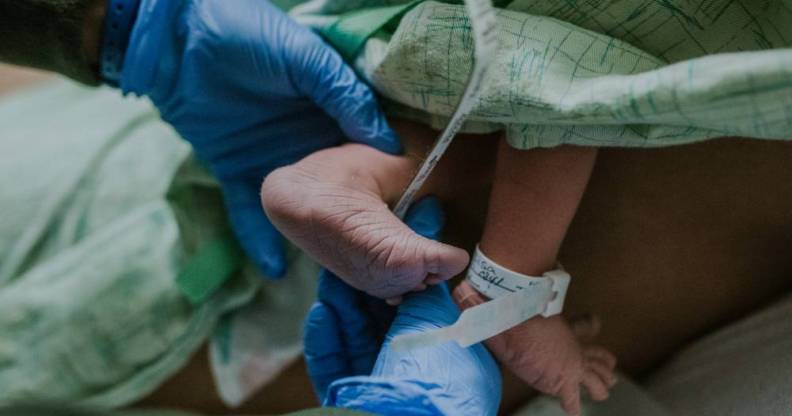UK’s first trans-inclusive birthing language guidelines launch at Brighton hospital. It doesn’t tell midwives to stop saying ‘mothers’

(Envato Elements)
Brighton and Sussex University Hospitals NHS Trust has launched trans-inclusive birthing language guidelines, encouraging midwives to use gender-neutral terms such as “chestfeeding” where appropriate.
The trust has launched the UK’s first clinical and language guidelines to support trans and non-binary birthing people, the culmination of many years’ work.
As part of their guidelines, BSUH detailed a series of gender-inclusive phrases for midwives, doctors and nurses to use to help LGBT+ service users feel more accepted.
Hospital staff have been encouraged to use terms including “birthing parent” alongside “mother” and “co-parent”, and “parent” or “second biological parent” alongside “father”, depending on the circumstances.
Healthcare providers have also been encouraged to use the word “chestfeeding” where appropriate, instead of exclusively using “breastfeeding”.
The terms will be used for documents, protocols and Trust-wide communication between healthcare teams.
Today we are launching the UK’s first clinical and language guidelines supporting trans and non-binary birthing people.
Follow us as we post throughout the week.
Find out more on our webpage
➡️ https://t.co/EPaesy4RWN#transpregnancy #nonbinarypregnancy #genderinclusion pic.twitter.com/qgzhJ2e6On
— UHSussex Maternity Services (@UHSussexMatServ) February 8, 2021
A policy document released by BSUH said staff should not stop using gendered words like “woman” or “motherhood”, but should consciously start adding more inclusive language into their lexicon.
It said: “Gender identity can be a source of oppression and health inequality. We are consciously using the worlds ‘women’ and ‘people’ together to make it clear that we are committed to working on addressing health inequalities for all of those who use our services.
“As midwives and birth workers, we focus on improving access and health outcomes for marginalised and disadvantaged groups.
“Women are frequently disadvantaged in healthcare, as are trans and non-binary people.
“By continuing to use the term ‘woman’, we commit to working on addressing health inequalities for all who use our services.
“We also recognise that there is currently biological essentialism and transphobia present within elements of mainstream birth narratives and discourse.
“We strive to protect our trans and non-binary service users and healthcare professionals from additional persecution as a consequence of terminology changes, recognising the significant impact this can have on psychological and emotional wellbeing.
“Acknowledging the cultural context in which service development occurs is vital in making trans and non-binary lives safer.”
‘Chestfeeding’ and gender-neutral birthing language draws mixed response.
While the move has been widely welcomed by midwives, trans parents and campaigners, there has been predictable outrage from the usual suspects after a Times front page story led many to wrongly believe the trust was eliminating terms such as mother and breastfeeding.
As this account has been quoted by The Times (without asking) I should point out their article on trans inclusion from BSUH maternity services is highly misleading. The new guidance explicitly maintains gendered language for mothers *alongside* trans-inclusive terminology. pic.twitter.com/FlPietMx5k— Ruth Pearce (@NotRightRuth) February 10, 2021
Speaking about the move on Good Morning Britain, Piers Morgan called it “language policing”.
“I fully support transgender rights to equality,” he claimed, adding: “This just annoys people. This kind of nonsense when you’re not even allowed to be called ‘dad’ or a ‘father’ without some equivocation when 98 per cent of the people on these wards would like to be called ‘dad’ or ‘mum’.”
The Brighton and Sussex University Hospitals NHS Trust’s gender inclusion midwives webpage said the hospital is on a “journey towards gender-inclusive care for everybody during pregnancy, birth and afterwards”, and is led by members of the trans and non-binary community.
It reads: “At BSUH, we acknowledge the additional challenges that gender identity can have on pregnancy, birth and infant feeding and recognise the importance of providing inclusive, respectful care to pregnant people and their families.”
The gender inclusion midwives will also provide extra support where possible during and following pregnancy. This includes: discussing where the individual feels most comfortable having their midwife appointments; using optional pronoun stickers for healthcare notes; writing a birth plan which includes the person’s language pronouns for talking about their baby; developing an infant feeding plan which may include breast/chestfeeding or expressing milk.
Additionally, the trust said their maternity services department will now be known as ‘perinatal services’ to reflect their wider use of more trans-inclusive language.
The new guidelines have been broadly welcomed by the healthcare community including midwives as well as trans groups. Campaign group TransActual tweeted: “This is fantastic, well done.
“Let’s hope many more trusts follow suit.
“Everybody deserves to be treated with dignity and respect.”
This is fantastic, well done. Let’s hope many more trusts follow suit. Everybody deserves to be treated with dignity and respect.— Trans Actual (@TransActualUK) February 8, 2021
Midwives warmly received the new gender-inclusive language from Brighton and Sussex University Hospitals NHS Trust. One midwife told BSUH to “keep up the phenomenal work – persevering for a progressive and inclusive NHS.”
https://twitter.com/BuntyLaiBoyd/status/1358914925226299396
Another midwife called the move “absolutely wonderful” as it was “improving access to childbirth care for a group that (mostly due to some of the responses here) find it very difficult to engage with appropriate care.”
This is absolutely wonderful – improving access to childbirth care for a group that (mostly due to some of the responses here) find it very difficult to engage with appropriate care. My femininity is not fragile enough to be threatened by inclusivity – it can only ever be good.— Jennie B 🐝 (she/her) (@JennieBMorris) February 9, 2021
PinkNews contacted Brighton and Sussex University Hospitals NHS Trust for comment.

